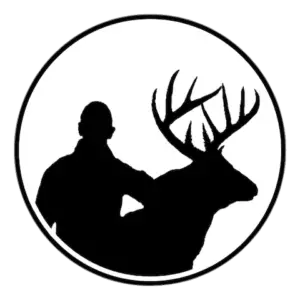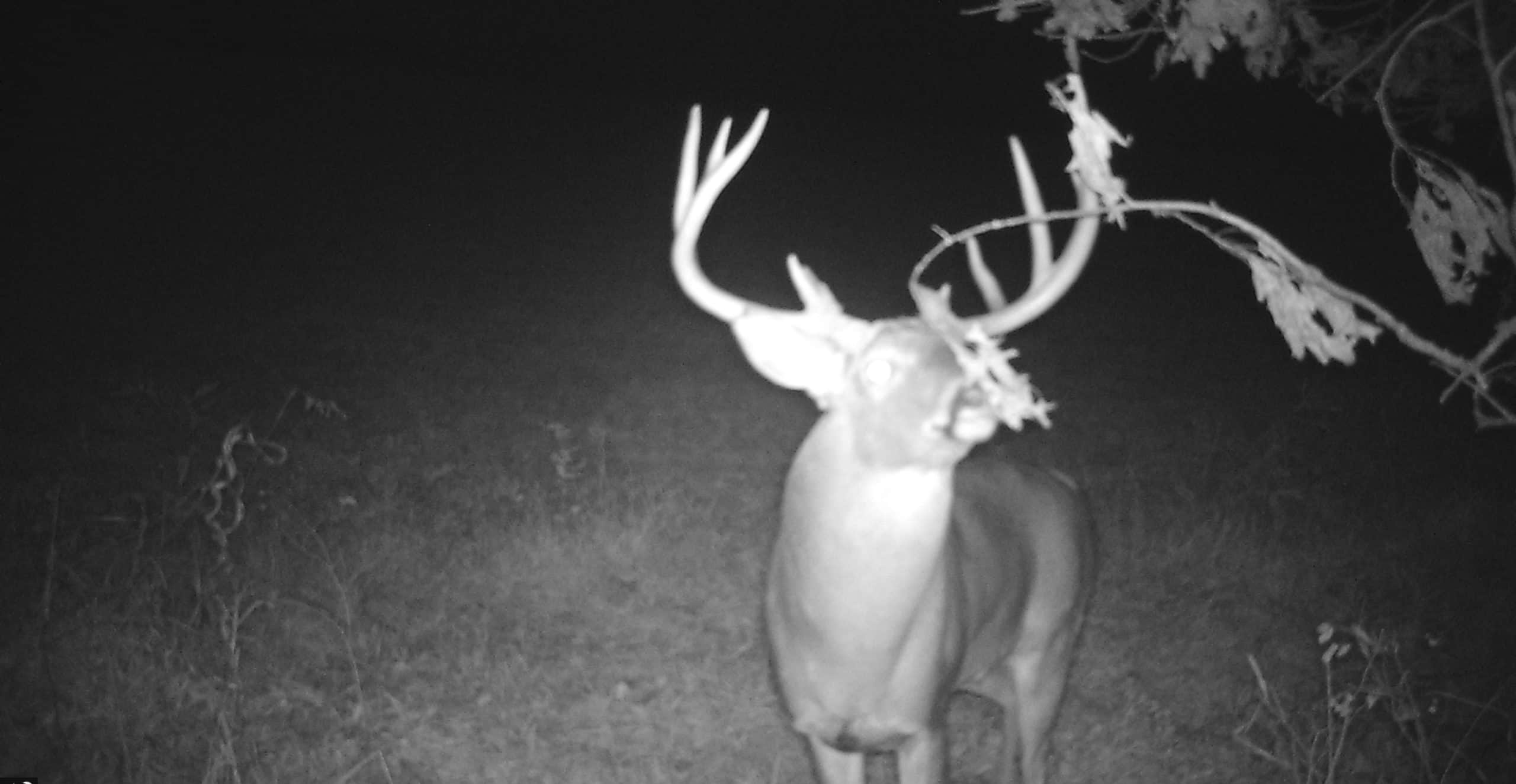If you want to understand what deer do at night, then you have come to the right place. I have been hunting and learning about deer since my college years in the late 2000’s. Nighttime deer behavior is a topic of interest for me, as I’m constantly seeking to gain more knowledge of what a full day in the life of a deer is like. Over the years I have developed a pretty good understanding of this topic. So, what exactly do deer do at night?
Deer do much of the same thing at night that they do during the day. They eat, sleep, drink, and socialize with each other. However, there are differences in how they go about this at nighttime as opposed to during daylight hours. At night, deer are more likely to eat, sleep, drink, and socialize in areas that are outside of their most secure and safe hiding places, commonly referred to as a deer’s bedroom.
The frequency, timing, and duration of deer activities are closely related to what the weather is doing and predation. These are the two most common causes of death for deer and are naturally the things that deer focus on the most for survival.
Humans are the number one predator of deer. Therefore, if people spend daylight hours pressuring deer, then we should anticipate an increase in nighttime deer activity or the deer leaving that area for the immediate future. Deer are smart enough to learn that they are less likely to encounter humans at night than they are during the day. Click the link to get a better understanding of how smart deer are.
Weather will influence deer movement in a variety of ways. In general, when temperatures drop below normal you can expect deer to be more active. In order to keep their body temperatures warm, deer move around and work on keeping their stomachs full. Since it’s typically colder at night than it is during the daytime, you can expect deer to move more regularly at night than during the day.
Now that you have a general sense of what deer do at night let’s dive a little further into commonly asked questions relating to this topic.
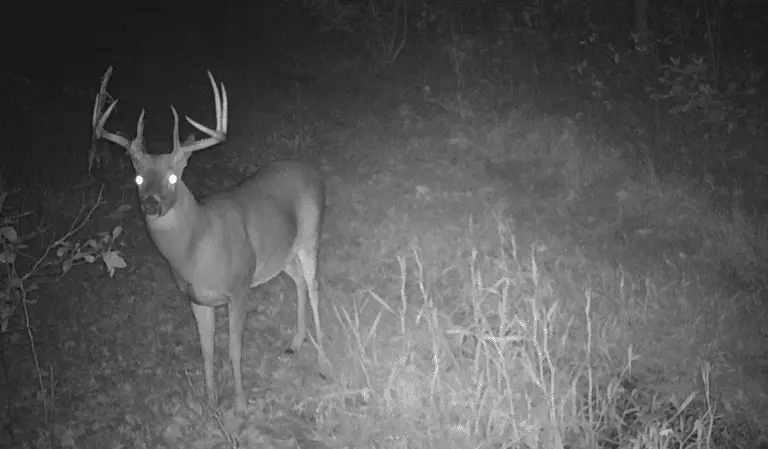
Do deer stay out all night?
Do deer stay out all night? If you asked a human if they “stayed out all night” they might think you are asking if they ever went home, or if they went to sleep. In this article we are talking about wild deer that are always outside. So figurately speaking the answer is yes, deer say out all night. However, I think the intent of this question is asking something different when we are talking about deer. Perhaps the question should be, do deer avoid sleeping at night? Or maybe, do deer avoid their bedrooms at night? Well, the answer to both of these questions is simple.
No, deer don’t stay out all night. A deer doesn’t avoid sleeping at night as they may take multiple naps throughout the night. Additionally, deer do not necessarily avoid their bedrooms either. A deer’s priorities are safety first and food second. Once they have eaten their fill, which might only take 1-2 hours, they will lay down and chew their cud in a safe place. That safe place might be in a wide-open field or within the security cover of their bedroom.
Deer spend more time moving around in darkness than during daylight hours. Read this article to learn more about deer activity: Are deer more active at night?
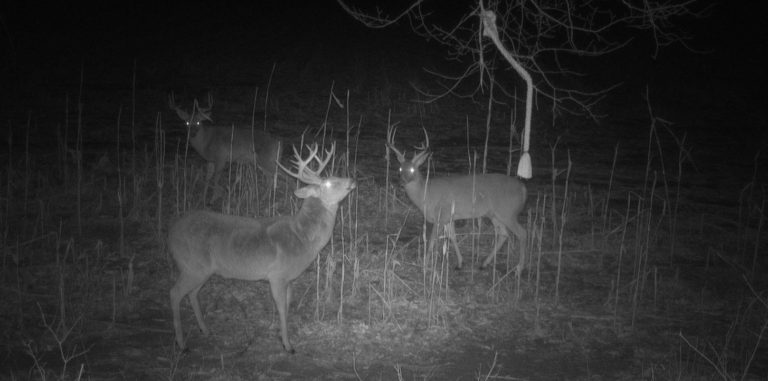
Do deer feed in the middle of the night?
I love driving around looking for deer in the evenings. Have you been in a car while the sun is setting and noticed deer feeding in open fields? Someone that sees this might wonder if deer feed in those fields all night long without taking a break from eating. While the answer to that question is no, the answer to our main question is more wide-ranging. So, let’s answer the question. Do deer feed in the middle of the night?
Yes, deer are browsers so they will eat and snack on food throughout the night just like they will during the daytime. After deer have finished their evening meal, which is their primary feeding time, they will usually move around to socialize with each other under the security of darkness. Sometimes it takes a deer one hour to fill their stomach and other times it might take them all night. The quantity and quality of the food available to deer will influence how long it takes them to fill their stomachs. Other factors such as breeding, human pressure, or individual deer personalities can also influence the amount of feeding that a deer partakes in at night.
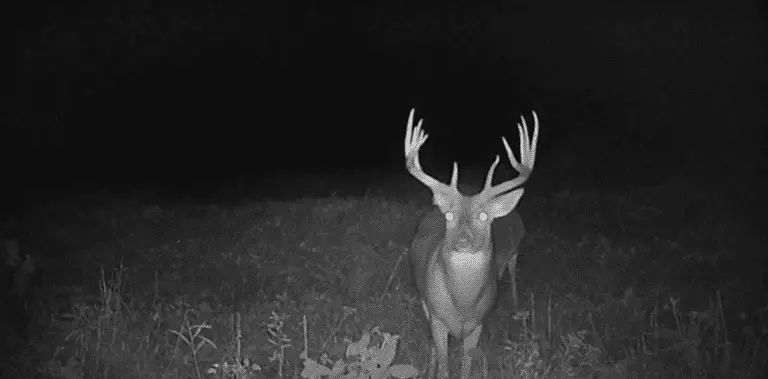
Where do deer stay at night?
When deer aren’t moving around to feed or being social with other deer, they will bed down to chew their cud or take a nap. Sometimes this happens in the middle of an open area like a food plot or cattle pasture. Other times it happens within security cover where deer usually like to bed down during daylight hours. If deer feel a sense of safety in a particular area and have access to food and cover, they will spend time just about anywhere at night.
A deer’s biggest concern is its safety. If a deer can bed down in the middle of an open field while surrounding deer keep a lookout for predators, it’s likely a good scenario for deer to bed down comfortably.
Deer are nocturnal. Therefore, they have an excellent ability to see far distances to detect predators at night. Bedding in an open field makes it much easier for them to spot predators approaching them. As long as security cover is close by, deer can easily escape if a threat were to present itself.
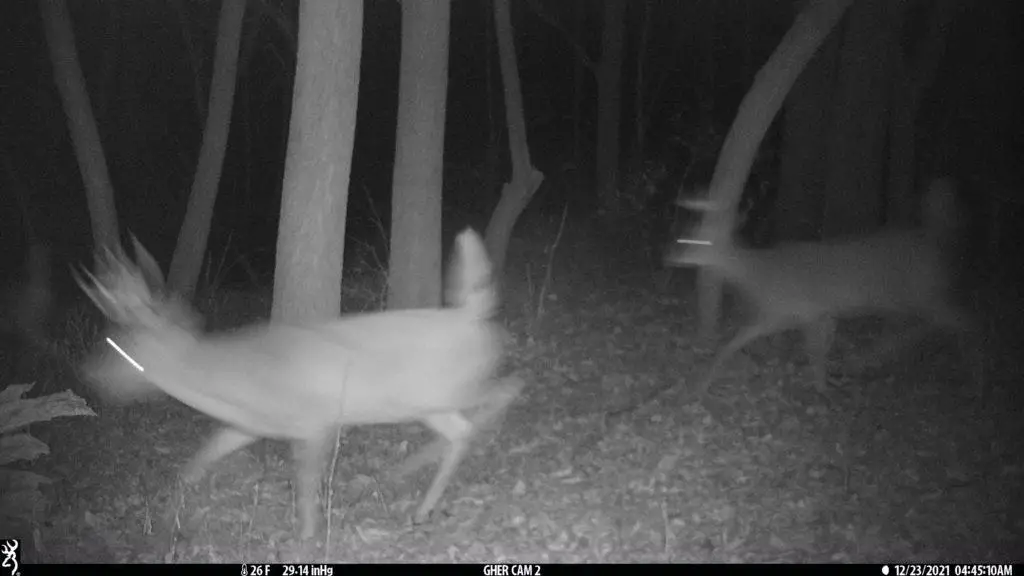
Where do deer hide at night?
Deer don’t really have to hide at night unless predators are after them. Deer are much more comfortable moving around in darkness because of a lack of human pressure during nighttime hours. Also, moving around at night helps them stay warm to regulate their body temperatures. If you suspect that deer are hiding during nighttime because of human pressure or some other reason, then those deer are going to hide in security cover. Deer will find area’s where those threats are least likely to exists and/or hide in places where they can easily escape from those threats when they happen.
To say that deer always remain hidden within dark places at night is not entirely accurate. This implies that deer only stay in their secure and concealed places at all times of day and night. That’s simply not true. A deer will respond to human pressure, or other predators, by fleeing into areas that they associate with safety. However, deer need a reason to be forced into those places at night if they aren’t already there. Deer are very curious and social animals. They prefer to be in social areas if there isn’t a threat to their safety when doing so. However, there are a few exceptions.
There are a few situations, other than pressure from predators, when deer don’t like to be social and avoid exposing themselves in open areas. Deer are all individuals and have unique personalities. Therefore, some deer are more anti-social than others. Mature bucks are commonly known to be ani-social than the rest of the deer herd in some cases.
Deer might also decide to hide from each other which can force them into hiding throughout the nighttime. For example, bucks will harass does by trying to breed them when the rut is on. This harassment can force does into hiding to prevent bucks from pestering them.
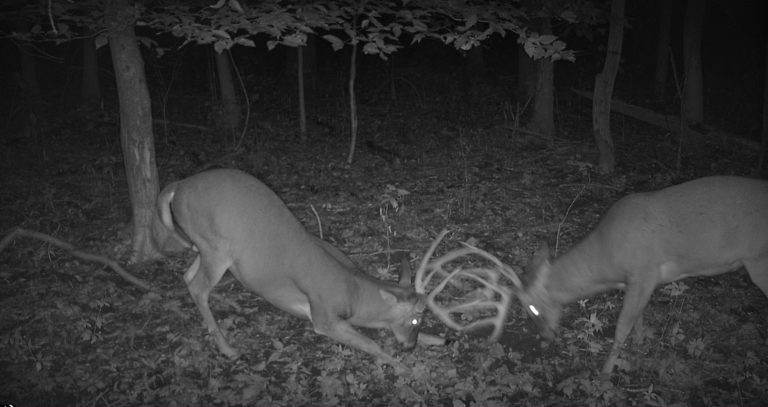
Conclusion
Deer do a lot of the same things at night that they do during the day. A deer will eat and sleep at night in your front yard if he feels safe doing so. Safety is a deer’s number one priority and food is their second. During the course of a night, a deer will do all kinds of activities and do them in no particular order. They will eat, drink, sleep, socialize, breed, fight, etc. Each of these activities may take a few minutes, or several hours, before they move on to the next activity. Just remember that safety will always be at the top of their mind since they are the prey in a world full of predators.
